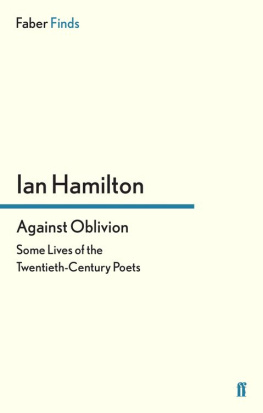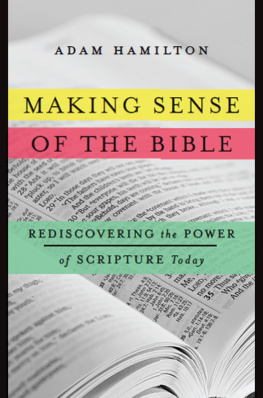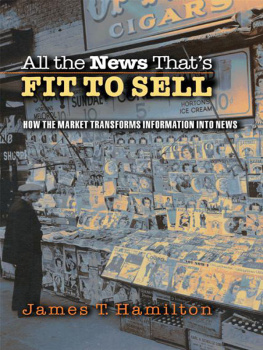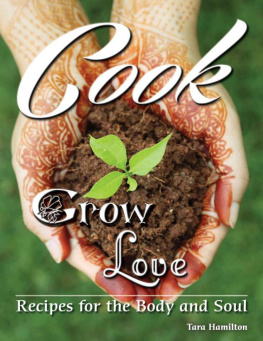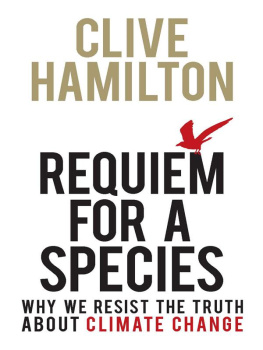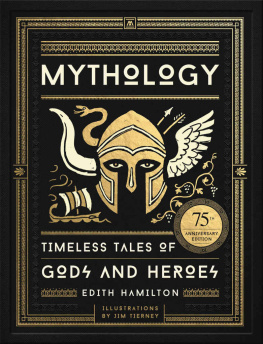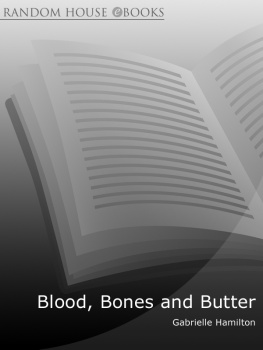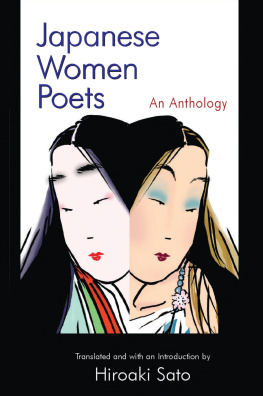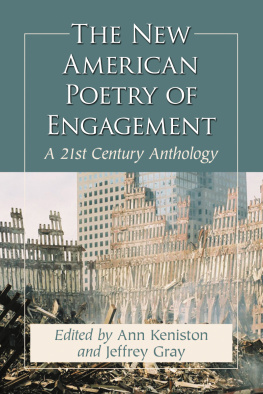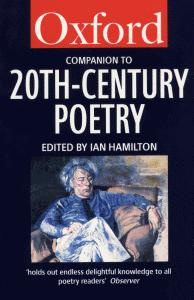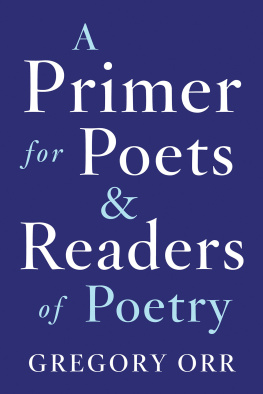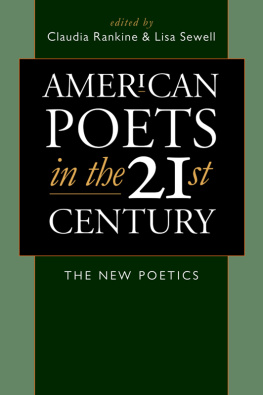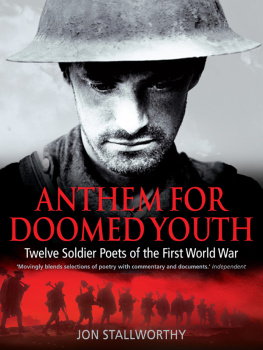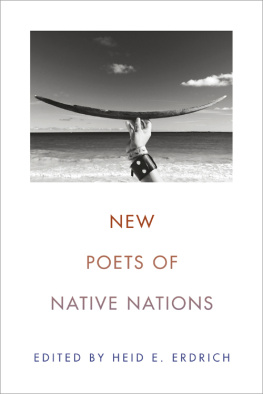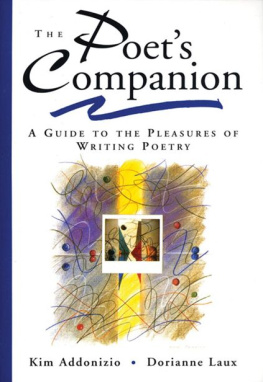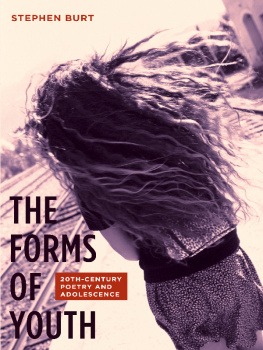Some of the appraisals included in this book derive, in ways both large and tiny, from earlier pieces Ive composed for newspapers and magazines over a forty-year-plus career of poetry-book reviewing. This being so, I have many editors to thank more, perhaps, than I can now remember. Some names do stand out, though: Arthur Crook (TLS), Karl Miller (NewStatesman,Listener,LRB), Alan Ross (LondonMagazine), Mary-Kay Wilmers (LRB, post-Miller), Alan Jenkins (TLS, post-Crook), Terry Kilmartin (Observer), Miriam Gross (also Observer, but later SundayTelegraph) and Claire Tomalin (SundayTimes). There have been other encouragers and, beyond them, a host of allies and provocateurs: roughly speaking, these people will know who they are, and what they did. Thanks also to Tony Lacey of Penguin Books and to Gillon Aitken, my agent. And special thanks to Patricia Wheatley for her assistance with the final text.
Some time ago it was suggested to me that I might try to write an updated, twentieth-century version of Samuel Johnsons LivesofthePoets. Like Johnson, I would it was proposed compose mini-biographies plus mini-critiques of about fifty modern, or near-modern poets. Like Johnsons, my poets would be dead and, like his, they would have enjoyed substantial reputations when alive. I would not, of course, attempt to rival Johnsons magisterial self-confidence , but on the other hand I would aim to be more conscientious than he was when it came to assembling my information. Johnson, it will be remembered, hated having to find things out he either knew them already or he didnt. Mostly, of course, he did.
All in all, then, this Johnson update seemed a nice idea, if somewhat gimmicky, and I agreed to have a go. I made a start by checking out Johnsons late-eighteenth-century selection. Indeed, my first discovery was that his selection was not just eighteenth-century , as I had lazily supposed. In addition to his Popes and Swifts there were lives of Milton, Dryden, Cowley and the like. In other words, his fifty or so poets were drawn from two centuries, not one. And the list I had begun compiling, of twentieth-century candidates, had in no time soared towards the fifty mark. Could this be just? Was it really true that the twentieth century had more worthwhile poets than the seventeenth and eighteenth centuries put together?
Continuing my scrutiny of Johnson, I was further nonplussed to find that, out of his selected fifty poets, I was familiar with the work of maybe half a dozen. That is to say, there were about forty poets who had enjoyed fame in two past centuries about whom I knew next to nothing. In a few instances, even their names were quite unknown to me. And here I was, with my fast-growing list of moderns, having a hard time deciding who to leave out: each name on my shortlist appeared to have a decent claim. And so, presumably, it must have seemed to Johnson. But were Johnsons poets really so forgotten, or was it just that I was ignorant? I asked a number of expert, or near-expert acquaintances to tell me everything they knew about Thomas Yalden, Thomas Tickell, Edmund Smith, Elijah Fenton, and so on. Like me, theyd never heard of them. I checked anthologies and reference books, like Margaret Drabbles OxfordCompaniontoEnglishLiterature, but with similar results: no Tickell, no Yalden, no Fenton. In some cases, I came across poets who were listed in the OxfordCompanion simply because they had appeared in Johnsons Lives. No other claims could be advanced for them, apparently. With the Tickells and the Yaldens, though, not even Johnsons hospitality had been sufficient to protect them from the final darkness. They had pretty well vanished from the map, and it seemed most unlikely that they would ever stage a comeback.
And yet in their lifetimes these same poets had presumably been made to feel, or allowed to feel, that they had talent which might last. At the very worst, they must have been given the idea that they were possessed of some uncommon gift. And they had lived their lives, perhaps, accordingly. Of course, in the eighteenth century, the writing of accomplished verses was often seen as a necessary adjunct to the gentlemanly way of life. At the same time, though, rivalries were intense, as we know from Popes Dunciad, and dreams of immortality were central to the whole business of creative composition.
In the eighteenth century, though, such dreams were not thought to be at odds with societys main drift. Poets were not automatically perceived as oddballs or outsiders. It was not until the nineteenth century that writers of poetry began to see themselves, and to let themselves be seen, as social outcasts. Even as the Romantic poet sanctified his calling, so he was made to feel that what he had to offer was not greatly in demand. And this rejection fed his pride, his sense of splendid separateness. In the twentieth century, however , this separateness was not always felt to be so splendid. One of the essential tenets of so-called poetic modernism was that the serious artist had been banished to the sidelines of a society whose imagination was deadened. From this marginal location, the poet could complain and criticize, if he so chose, or he could cultivate his sense of alienation and write simply for himself, or for his friends, and as obscurely as he wished. What he could not hope for was the kind of central, civilizing social function for which so he at heart continued to believe his gifts and insights so crucially equipped him: the kind of function that Matthew Arnold had in mind, or said he had in mind.
In other words, poetry in the twentieth century did not take over from religion, as Arnold none too persuasively predicted that it might. It did not become the source of that sweetness and light which a democratized, industrialized, commercialized society so badly needed in order to counterbalance its own dehumanizing drift. And yet poets continued to write poems, and continued also to insist that what they had to offer was, potentially, of world-altering significance. In practice, as they could all too clearly see, the world did not have much use for them. For some poets, this spurning made it all the more essential that they continue to uphold the faith, in one way or another. Some might retreat into a sort of defiant obscurantism; others might do a deal and seem ready to reduce, or secularize, the pretensions of their craft. On the whole, though, I think its true to say that poets at the end of the twentieth century were no less convinced of their own value than they had been at the beginning. To which a present-day philistine might well retort: but surely that adds up to one hundred years of wasted effort?
But most poets cant help believing they are poets, and believing, too, that being a poet really matters. And this brings me back to my LivesofthePoets project. In spite of my Johnson studies, when I came to plan my update I still found myself with a list of nearly fifty twentieth-century poets, each of whom, it seemed to me, would have to be included in my Lives, either on the grounds of reputation, or personal taste, or because their careers had literary-historical significance. Even so, this list of mine was surely far too long. How many of my poets would ultimately go the way of Johnsons? How many had already gone that way? Again, I tested out my list this time, my moderns list on a few expert and near-expert friends. Somewhat to my surprise, about six of the poets I had listed were utterly unknown. Another dozen had been heard of but not read. A further dozen had been read but not remembered: Yes, I know the name. Ive read him, but what did he write? Remind me. Lurking within my list of Lowells, Berrymans and Plaths, there was a second list, a sub-list, of poets once admiringly reviewed and perhaps thought of as the next new thing, but now teetering on the edge of oblivion, an oblivion which presumably they had spent whole lifetimes seeking to transcend, by dint of what they took to be their gifts as poets. Did they, within themselves, suspect or fear that this would be the likely outcome? And did this in turn affect the way they lived, the way they wrote?

